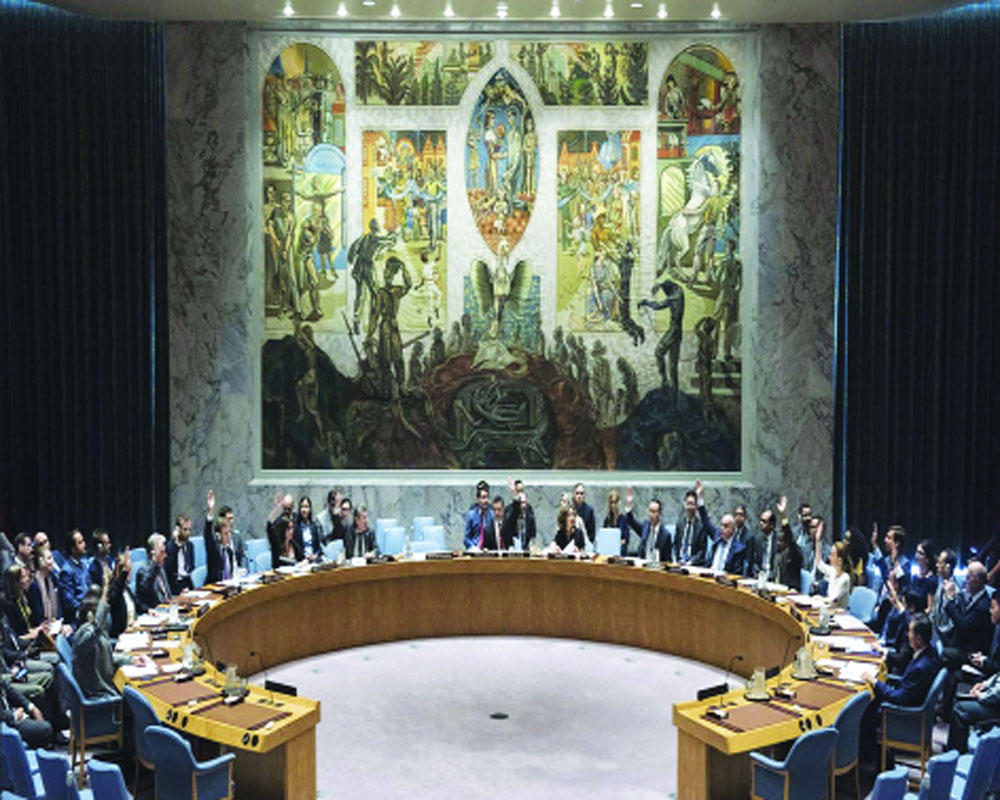
SOURCE: The Pioneer
The United Nations General Assembly (UNGA) session this year is significant in more ways than one. It is the first virtual session, the first being held under the shadow of the pandemic and the first reset effort when de-globalisation and protectionism spin the narrative of the day as the world stands divided between polarities. It also happens to be the 75th anniversary of the august institution, and, therefore, a time to step back for member-countries and redefine their participatory role and contribution in a post-pandemic world.
The theme is resonant of our times and at the same time loaded with possibilities, “The Future we want, the United Nations we need: reaffirming our collective commitment to multilateralism — confronting COVID-19 through effective multilateral action.” But Pakistan Prime Minister Imran Khan overrode the solemnity of the occasion and the geopolitical re-adjustment it demands by raising the Kashmir issue again and launching a diatribe against its changed status, ramming the same paragraphs of his earlier speeches.
The world has accepted the constitutional space within which India abrogated Article 370 and has long turned a deaf ear to Khan’s persistent chorus. But that has not stopped him from trying to “internationalise” the issue, even at the risk of appearing petty in the middle of an unprecedented world crisis. India’s First Secretary in the Permanent Mission to the UN, Mijito Vinito, walked out when Khan started his rant and availing the right of response, made a pointed retort. As all the video speeches by world leaders had been pre-recorded, India did have an inkling of what was to come. But Prime Minister Narendra Modi left the rebuttal to officials and himself claimed the high moral ground by highlighting India’s role as a “pharmacy to the world” while elaborating on its contribution to global cooperation against COVID-19 by aiding more than 150 countries. He also prioritised India’s role as a South-South development partner, especially in the context of the India-UN development partnership fund and reiterated the pledge to take on global terrorism. By highlighting India’s global commitment to welfare and respect of rule-based laws, he even negotiated a better role for India in the UN and sought reforms. This was a smart move, aligning India’s objectives with the world imperatives and dismissing Pakistan’s moves as unworthy of reaction from Modi himself. Khan’s provocation has clearly not worked up either opinions or compelled Modi to dignify that with a reaction. And except Turkey, which echoed similar concerns on Kashmir, there was no taker for Pakistan’s fresh tirade against us. That, too, because the latter has convinced the former that together they need to set the agenda for a neo-Islamic world as modern nations, considering the Arab world had accepted India and had been co-opted by the US to establish a working relationship with Israel.
Running promptly out of alliances and friends, and given the US’ pro-India tilt, Pakistan is progressively getting aggressive on territorial gains for itself. It desperately wants to legitimise its illegal hold on Kashmir to counter India’s abrogation of Article 370. That’s the reason why it announced elections for the legislative assembly of Gilgit-Baltistan on November 15. Of course, India has protested against this forced conversion of a military occupied territory into an autonomous political entity but the fact is Pakistan wants to justify it as a reaction to India’s move and is hoping to internationalise the issue once again. Besides, elections would also give legitimacy to the China-Pakistan Economic Corridor, which runs through Gilgit-Baltistan, thereby riling up India further. This follows its earlier declaration to redraw its maps and appropriate what it fancifully feels India owes it, parts of Kashmir, Ladakh and Junagadh in Gujarat. This is not backed by any credible reasoning, support groups, historical reasoning or legal validity. That’s why Pakistan’s cartographic offensive seems part of a larger Chinese design in the region and not just its independent move as it clearly shows that Kashmir shares a border with China. Held off by India on Ladakh that seems to have driven a wedge in China’s greater plan to control the Karakoram by squeezing us with salami-slicing, Pakistan’s territorial claims are clearly intended to exhaust our capacities and opening up a second flashpoint along our borders. Pakistan is simultaneously heating up the Line of Control (LoC); its ceasefire violations and infiltration bids have gone up by about 60 per cent this year. If recent reports are to be believed, then the Chinese have had a series of meetings with their Pakistani counterparts in Gilgit-Baltistan and have been aiding Pakistan clandestinely to revive old terror networks against India. Chinese drones have been deployed for surveillance missions along the LoC. Debt-trapped by China, Pakistan forgets that such unilateralism will beget unilateralism from the Indian side as well. And hurt its interests. The new map is nothing but an adventurist version of its 1947-48 map and negates all bilateral agreements that came after it, including the 1972 Shimla Agreement. What then would be the cascading impact on all subsequent treaties, like those on water-sharing? What about our valid land claims? Pakistan doesn’t realise that its Kashmir strategy is not working anymore and exported militancy is tiring out in the Valley. And China may use it for posturing but apart from niggling India with its proxy, will delink itself and go for a one-on-one strategic engagement with us for its larger concerns. Pakistan has misread its transactional and inscrutable all-weather friend.






